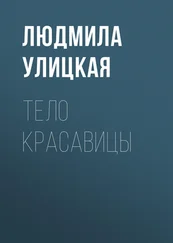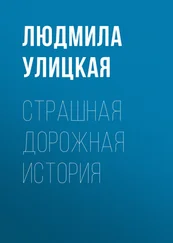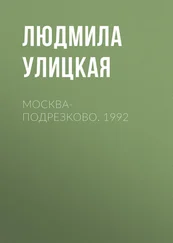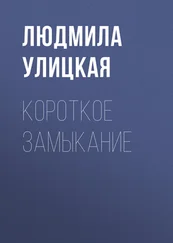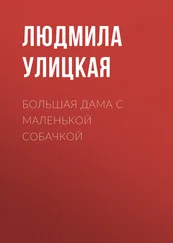“A girl sent it to me,” Butonov said, shrugging. “Any good?”
“Yes. She probably lifted it from somewhere. Although I can’t think where,” Ivanov pronounced his highly professional judgment.
“Out of the question,” Butonov retorted confidently. “She’s not the kind to copy someone else’s stuff. She wrote it herself, I’ll swear she did.”
He had already forgotten about his latest southern romance, but this sweet girl seemed to have given it some quite excessive significance. Butonov had never had anyone sending him letters, had never written any himself, and had no intention of replying to these; but still they came.
Masha kept walking to the post office in Sudak and was terribly upset when there was no reply. Unable to bear it any longer, she rang Nike in Moscow and asked her to go out to Rastorguevo and see whether anything had happened to Butonov or why he wasn’t replying to her. Nike refused irritably, saying she was far too busy.
Masha was mortified: “Nike, what are you saying? Have you gone crazy? I’ve never asked you to do anything like this before! You have a new affair every season of the year, but I’ve never known anything like this!”
“Oh, to hell with it! I’ll go tomorrow,” Nike agreed.
“Nike, I beg you! Today! Go this evening!” Masha implored.
The next morning Masha again walked all the way to Sudak with the children. They romped around the town, went to a café, and had an ice cream. She didn’t manage to get through to Nike, though. There was no one at home.
That evening Little Alik fell sick. His temperature went up and he started coughing. It was his chronic asthmatic bronchitis, which was the reason Masha stayed down here with him for two months at a time in the Crimea.
Masha was dancing attendance on him for a whole week and only on the eighth day did she get to Sudak. There was still no letter for her. Actually there was, but only from Alik. She phoned straight through to Nike who reported drily: “I went to Rastorguevo. I saw Butonov. He has received your letters, but he hasn’t replied.”
“But is he going to?” Masha asked stupidly.
“How should I know?” Nike responded testily.
By now she had actually been to Rastorguevo a number of times. On the first occasion Butonov had been surprised, but everything had been relaxed and fun. Nike really had only intended to run Masha’s errand but ended up staying the night in his large, half-redecorated house.
He had started renovating the house two years before, after the death of his mother, but somehow things had come to a halt and the half which had been redone stood in striking contrast to the half-wrecked part which was cluttered with wooden trunks, rough peasant furniture left over from his great-grandfather’s time, and lengths of handwoven cloth. There, in the wrecked half, Nike built their hurried little nest. Leaving in the morning, she did remember to ask him: “Why don’t you reply to her letters? She’s really upset.”
Butonov was used to being informed on but didn’t like being told off. “I’m a doctor, not a writer.”
“Well, try very hard,” Nike suggested.
The situation struck Nike as comical: Masha, as clever as clever could be, had fallen in love with this very basic stud. He suited Nike admirably: she was in the middle of getting divorced; her husband was being a complete bastard and making all sorts of demands, even to the point of wanting his share of the apartment; her fill-in lover had finished his film production course in Moscow and left; and her long-term Kostya was annoyingly eager to embark on a life of matrimonial bliss with her as soon as he heard about the divorce.
“If it’s that important, write them yourself,” Butonov muttered.
Nike laughed uproariously. The suggestion struck her as wild. How she and Masha would laugh together about all this nonsense once her sister got over being so hot for him.
CHAPTER 15
Medea retired from her job in the autumn, on the Revolution Day holiday in November. Her immediate plan for filling her new free time was to mend the quilts, which became tatty unbelievably quickly over a summer season. In readiness she got in satin material and a boxful of good bobbin thread, but discovered the first evening she laid a distressed quilt on the table that its flowers were detaching themselves from their faded background while others, three-dimensional and shifting, came floating in to replace them.
She was running a temperature, Medea guessed, and closed her eyes to shut off the stream of flowers. Happily, Nina had come from Tbilisi only the day before.
It seemed to be the same illness from which she had suffered just before her marriage, when Samuel had looked after her so zealously and with such tremulous love and tenderness that he had every reason to quip later, “Other people have a feverish honeymoon, but Medea and I had a honeymonth of fever.” In the intervals between attacks of furious shivering and fuddled semiconsciousness, Medea lapsed into a state of serene tranquility in which it seemed to her that Samuel was in the next room and would come in to see her in a minute, awkwardly bearing a tumbler in both hands and with his eyes slightly bulging because the tumbler was hotter than he had expected.
Instead of Samuel, however, it was Nina who emerged from the semidarkness, enveloped in the fragrance of St.-John’s-wort and dissolving honey, with a thick glass tumbler in her thin, flat hands and her matte-black eyes deep-set like Samuel’s, and Medea realized something she seemed to have been waiting for for a very long time, and now it finally had come to her like a revelation: Nina was their daughter, Samuel’s and hers, their little girl; she had always known that but for some reason had forgotten it for a long time, but now it had come back to her and it was such a joy. Nina helped her up from the pillow, gave her the fragrant drink, and said something, but the meaning didn’t quite get through to Medea, as if she were speaking a foreign language: “Yes, yes, Georgian,” Medea remembered.
But the intonation was so rich and clear that she could understand everything just from the expressions on Nina’s face, the movements of her hand, and also from the taste of the drink. It was surprising too that Nina could anticipate her wishes, and even opened and closed the curtains a moment before Medea was going to ask her to do it.
Medea’s relatives in Tbilisi were the descendants of her two sisters: Anelya, who was the elder, and Anastasia, whom Anelya had brought up after the death of their parents. Anastasia had left a son, Robert, who was unmarried and seemed to be slightly touched in the head. Medea had no contact with him.
Anelya had not had any children of her own. Nina and Timur were adopted, so the Tbilisi relatives were a grafted branch of the family. These children were blood relatives of Anelya’s husband Lado, his nephew and niece. Lado’s brother Grigol and his wife Susanna were an absurd and unhappy couple: he was a fervent champion of a fair deal for traditional craftsmen; she was the city’s madwoman, with a penchant for Communist Party work.
Lado Alexandrovich was a musician and professor at the Tbilisi Conservatory. He taught cello and had nothing in common with his brother, whom he had hardly seen since the mid-1920s.
Lado and Anelya first saw their nephew and niece early one morning in May 1937. They were brought to their house by a distant relative after the arrest of both parents in the night.
The law of pairs is only a particular instance of a more general law of recurrence of the same event, whose purpose seems sometimes to be character formation, sometimes the accomplishing of destiny. In Anelya’s life it operated very precisely. Exactly ten years had passed since Anastasia married and left home, and now fate had again brought orphans into their house, but two this time.
Читать дальше

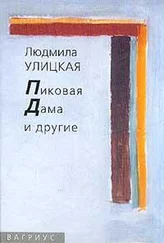
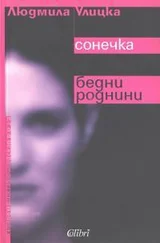

![Людмила Улицкая - Сквозная линия [litres]](/books/393468/lyudmila-ulickaya-skvoznaya-liniya-litres-thumb.webp)
